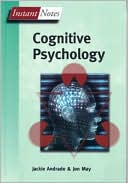

 |

|

The average rating for Instant Notes in Cognitive Psychology based on 2 reviews is 4.5 stars.
Review # 1 was written on 2013-09-30 00:00:00 Daniel Sytsma Daniel SytsmaThis book covers all the key aspects of cognitive psychology in a succinct and structured format, enabling readers to appreciate the important developments in the field. It is a handy reference for people like me who just embarked on the discovery of cognitive psychology, mainly because It divides abstract and complex topics into manageable chunks, provides clear signposts for related topics and offers practical advice on topics that average reader might find interesting and useful. Here is a full list of content chunks: 1. History of cognitive psychology 2. Perception - sensation, auditory and visual perception 3. Attention - auditory and visual attention, dual task performance, automatically 4. Memory - short-term memory, limits and failures of memory 5. Mental representation - representations, imager, concepts and connection 6. Problem solving (Very pragmatic and useful) 7. Reasoning and decision making - deductive and inductive reasoning (Very useful) 8. Language 9. Comprehension - Dyslexia (Most useful) 10. Intelligence - Nature and Nurture (Interesting materials) 11. Consciousness 12. Emotion and mood - Relationship between mood and memory, intense and exciting materials! The book is written primarily for undergraduates taking introductory level cognitive psychology courses. Thus, I consider average people as intended readers of the book and highly recommend it to anyone who wants a quick reference to the matter. |
Review # 2 was written on 2020-07-06 00:00:00 John Sumner John SumnerWe are not in a position to give so much as a hint as to the causes of these temporal disturbances of the process of development. A prospect opens before us at this point upon a whole phalanx of biological and perhaps, too, of historical problems of which we have not even come within striking distance. I admire Freud in a similar way to that which I encounter Augustine. Despite glaring mistakes, there is a pellucid grace to the prose. The reasoning in a local sense is wonderful, despite the conclusions being wrong. It always is an instance of application. The layered nature of conclusions is compelling in these Three Essays, the footnotes allude to the editing, insertion and omission which Freud adjusted his thoughts, all the while admitting that he was lost in the weeds and that we were all damaged goods The taxonomy of inversion and perversion is a ticklish curiosity. Such must have been dangerously transgressive at the time. Kinsey eventually told everyone that there isn't a normal and that we should all relax and self-medicate. I read this as to bolster myself for further exploration and spelunking into Irigaray and Derrida |
CAN'T FIND WHAT YOU'RE LOOKING FOR? CLICK HERE!!!